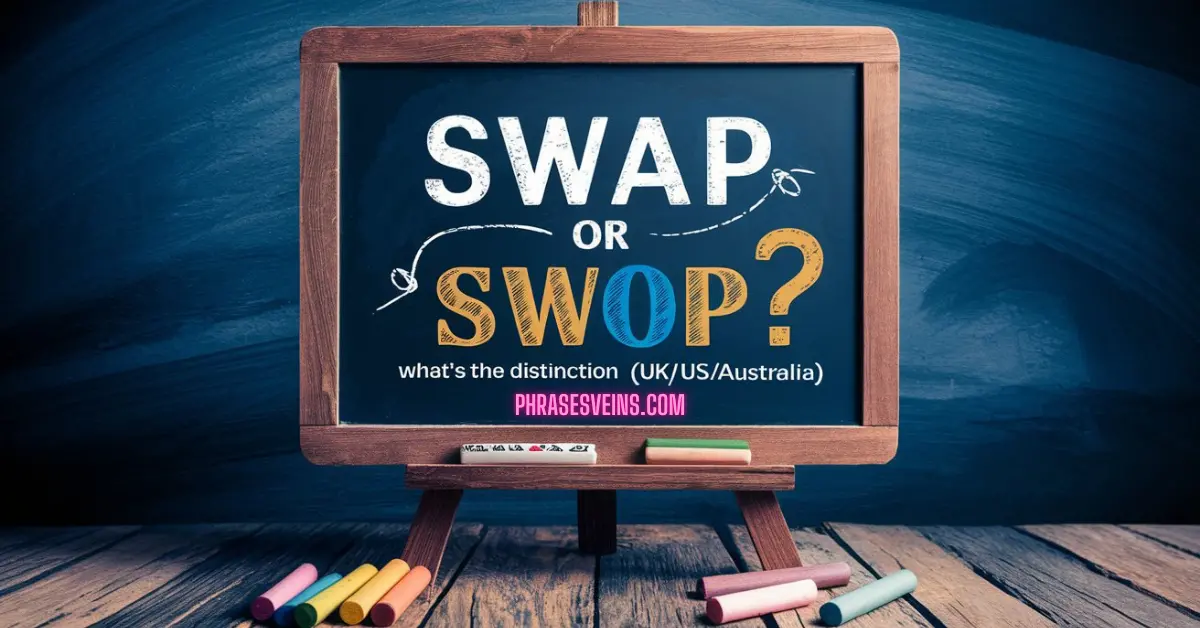When it comes to the words “swap” or “swop,” people often wonder if they mean the same thing or if they are used differently. Both words are tied to the idea of exchange, whether you’re bartering goods, trading services, or simply switching items. But these words carry subtle differences in usage depending on the region—especially in British English, American English, and Australian English.
In this article, we’ll explore the historical usage, regional preferences, and language variations that define these terms. You’ll also learn how to use them in sentences, understand their roles in global communication, and gain practical tips for choosing the right one in any context.
The Origins and Meanings of Swap and Swop
The words “swap” and “swop” both come from Old and Middle English. Historically, they were used to describe acts of bartering or trading. Over time, linguistic evolution shaped their meanings, but the essence remained the same: a mutual exchange.
Today, “swap” is widely recognized across all English-speaking countries, while “swop” is primarily seen in UK English and Aussie English. For example, the British spelling “swop” reflects a more traditional form of the word, but in modern contexts, it is often replaced by “swap.” In US English, “swop” is almost non-existent.
| Term | Origin | Primary Usage | Modern Adaptation |
| Swap | Old English | Global | Common in all regions |
| Swop | Middle English | UK and Australian terms | Informal, declining use |
Regional Preferences for Swap or Swop
Swap vs. Swop in the United Kingdom
In British English, both “swap” and “swop” have been used for centuries. Past usage shows that “swop” was more common in older texts. However, linguistic change over time has made “swap” the dominant term. Today, regional dialects in the UK may still favor “swop” in informal settings, especially in rural areas.
Current UK variations lean toward “swap,” particularly in professional or written communication. For instance, a British ad might say, “Swap your old phone for a discount,” while a casual conversation might still use “swop.” This highlights the dialectal differences within the region.
Swap vs Swop in the United States
In American English, “swap” has always been the preferred term. Historical texts and regional usage patterns show little to no adoption of “swop.” The American focus on streamlined language may explain why US English avoids “swop” altogether.
Today, “swap” is common in both casual and formal settings in the U.S. Whether it’s swap contracts in business or swap files in technology, the term is deeply embedded in American vocabulary. For example, a tech tutorial might explain, “Use a memory swap to optimize performance.”
Swap vs. Swop in Australia
In Australian English, both terms are recognized, but “swop” enjoys occasional use in informal contexts. Historically, Aussie English borrowed “swop” from British influence, but the global dominance of “swap” has shifted preferences.
Modern Australian usage sees “swap” in professional and media settings, while “swop” appears in casual conversations. For example, Australians might say, “Let’s swop jobs for a day” when speaking informally. These regional differences reflect Australia’s blend of global and local influences.
Understanding the Usage of Swap and Swop in Sentences
Examples help clarify how “swap” or “swop” fit into sentences. Consider these:
- “We can swap houses for the holidays.”
- “Can we swop roles for the presentation?”
The choice between the two words can impact clarity. In formal writing, especially in US English, “swap” is almost always the better option. In contrast, UK variations or Australian dialects might allow for “swop” in casual text.
Practical tips for choosing the right term include knowing your audience and the regional preferences of your readers. If in doubt, opt for “swap,” as it is more universally understood.
The Impact of Language Evolution on Swap and Swop
The rise of global communication has significantly influenced the usage of “swap” and “swop.” With the dominance of American English in media and technology, “swap” is becoming the standard term worldwide. For example, international communication in tech often uses “swap files” to describe data exchanges.
Language trends suggest that “swop” may continue to decline, especially in professional contexts. However, local dialects in the UK and Australia may keep the term alive in informal speech. As one linguist noted, “The survival of a word depends on its adaptability in global networks.”
Swap and Swop in Global Communication Networks
The internet and social media have accelerated the spread of US English, favoring terms like “swap.” Platforms like Twitter, Reddit, and LinkedIn show overwhelming use of “swap” in both casual and professional contexts.
However, regional speech still thrives in local forums. For instance, a UK-based forum might include sentences like, “Would you swop your day off with mine?” This illustrates how language development adapts to both global and local needs.
Examples from Social Media, Online Forums, and Global Platforms
- Twitter:
- “Looking to swap my concert tickets for next week.”
- Tech discussions often include phrases like, “Here’s how to swap files between devices seamlessly.”
- Reddit:
- Users frequently discuss swapping items in subreddits like r/Barter or r/Trade.
- Rare instances of “swop” appear in UK-based threads, e.g., “Would anyone swop work shifts this weekend?”
- Instagram and TikTok:
- The hashtag #SwapIt trends with posts about exchanging clothes, books, or lifestyle tips.
- Minimal use of “swop,” though some Australian users tag local exchanges with it.
- Online Forums:
- British parenting forums might include phrases like, “Happy to swop babysitting duties this Friday.”
- Australian forums occasionally reflect informal “swop” usage, e.g., “Anyone want to swop their car for mine?”
- Marketplaces (eBay, Gumtree):
- U.S. sellers: “Willing to swap for something of equal value.”
- Australian listings: “Open to a swop if it suits both parties.”
- Global Platforms:
- “Swap” dominates globally due to American English influence and widespread tech usage.
- “Swop” is more localized, appearing in specific regional speech contexts, especially in the UK and Australia.
These examples highlight how regional preferences and global communication influence the choice between “swap” or “swop” in digital spaces.
Read More >>> How Are You Fairing or Faring? Differences + Examples
Frequently Asked Questions
Is it swop or swap in British English?
In British English, both “swap” and “swop” are used, but “swap” is more common in modern contexts, while “swop” appears in informal or older texts.
What is the meaning of swap and swop?
Both mean to exchange, barter, or trade one thing for another. “Swop” is an alternative spelling of “swap,” mainly seen in British and Australian usage.
Is swop an American word?
No, “swop” is rarely, if ever, used in American English, where “swap” is the standard term.
What is the difference between SWOP and change?
It implies an exchange between two parties, while “change” refers to altering or replacing something without involving a direct trade.
Conclusion
Understanding the distinction between swap or swop is essential for effective communication. While regional differences and historical context shape their usage, “swap” is the more universally accepted term. Whether you’re navigating British spelling, US usage, or Australian preferences, choosing the right word depends on your audience and context.
By recognizing these dialectal differences and embracing the evolution of language, you can ensure clarity and precision in your writing. So next time you’re deciding between it, remember the regional variations and the global networks shaping how we speak today.

Welcome to PhrasesVeins, where Arabella Reed brings language to life. With a passion for grammar and phrases, Arabella offers unique insights to help you master language and enhance your expression. Whether you’re a language enthusiast or looking to improve your skills, Arabella’s work guides you through the beauty of words.

